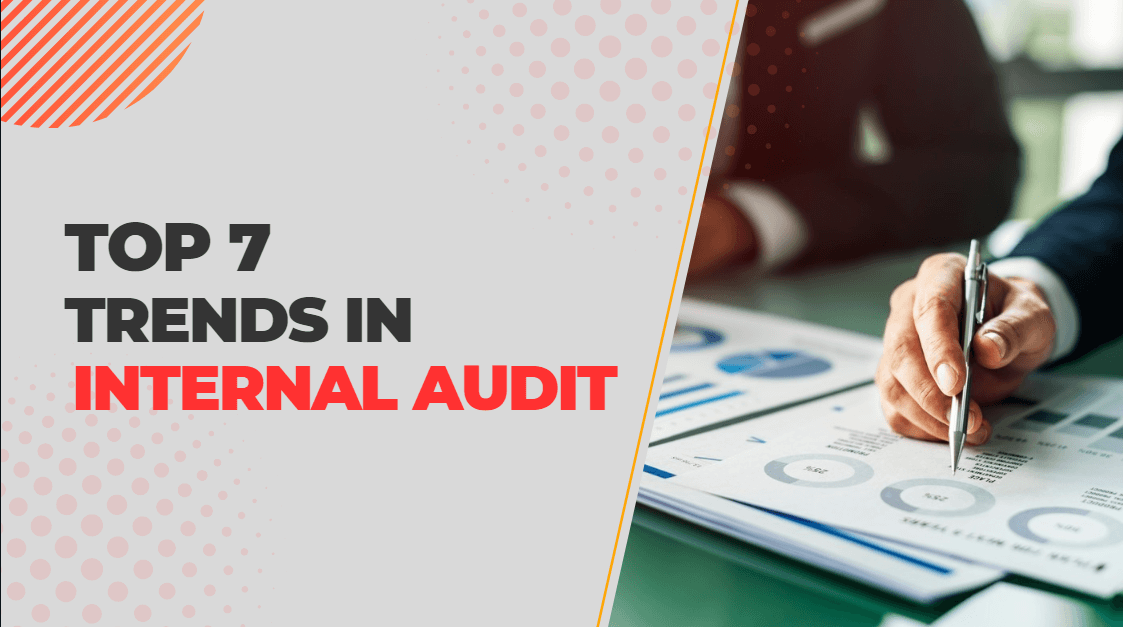Over the years, internal audit has adapted to organizations’ changing needs, responding to economic fluctuations, technological advancements, and regulatory shifts. As the business spectrum continues to evolve, so too does the practice of internal audit. Emerging trends are reshaping the profession, driving innovation and ensuring that internal auditors remain relevant and effective in supporting organizational goals.
In this blog, we will explore the top trends shaping the future of internal audit. We will delve into how these trends are influencing the way internal auditors work, the tools they use, and the value they deliver to their organizations.
Top Trends In Internal Audit
1: Expanding Spectrum of Internal Audit
The scope of internal audits has expanded significantly in recent years, reflecting organizations’ evolving needs. Beyond traditional financial controls, internal auditors are now tasked with assessing the effectiveness of governance, risk management, and compliance frameworks. This broader mandate is driven by the recognition that organizations face a multitude of risks, including operational, strategic, and reputational threats. Internal auditors are expected to provide assurance that these risks are being effectively managed.
2: Cybersecurity & Privacy
Cybersecurity and privacy have become critical concerns for organizations as they safeguard sensitive data from breaches, attacks, and misuse. Internal audits play a crucial role in evaluating an organization’s cybersecurity framework, identifying vulnerabilities, and ensuring compliance with regulations like GDPR or HIPAA. Through systematic reviews of policies, controls, and procedures, auditors assess the effectiveness of security measures and recommend improvements to mitigate risks.
Privacy audits, on the other hand, focus on ensuring that personal data is handled in accordance with relevant laws and best practices. They evaluate how data is collected, stored, accessed, and shared within an organization. By conducting regular privacy audits, companies can maintain trust, avoid legal penalties, and reinforce a culture of responsible data management.
3: Shift From SOX Compliance Towards Risk-Based Auditing
To prevent corporate fraud, auditors need to adhere to SOX compliance. It is the act of adhering to the financial reporting, information security and auditing requirements. However, in recent years,
The importance of managing risks across the entire organization, along with addressing fraud, is on the rise. As modern companies rely more on technology, there’s a growing need to prioritize risk evaluation due to the faster pace at which these risks can affect operations. Internal audit teams are also taking on greater accountability in areas like fraud prevention and IT security reviews.
4: Upgrading Audit Infrastructure and Technological Advancement
Big enterprises with multiple operations need complex auditing requirements. These audits aren’t limited to finance but also cover assessments and inspections related to operations, quality, safety, and suppliers. To make audits a smooth process, companies are upgrading the tech infrastructure to carry out risk assessments and collect audit data.
Now, companies are ditching their legacy systems for web-based integrated audit management systems. By doing so, they gain an edge in the audit process by streamlining the internal audit function to gain more strategic value.
Upgrading the audit infrastructure can benefit the company by creating a transparent and collaborative environment and facilitating data-driven decision-making.
5: Evolution In the Roles of IA
Every industry evolves over the years, adapting to new trends. To stay important in the fast-changing world, it’s necessary to keep learning and adapting to what the market needs. The same goes for the role of internal auditors. The role of IA has shifted dramatically in recent years, reflecting key internal audit trends that extend far beyond traditional financial reviews.
In e-commerce and banking, auditors are now leveraging data analytics to uncover deeper operational insights. At the same time, those in IT companies focus on assessing emerging risks, cybersecurity, and compliance with evolving privacy laws. Meanwhile, auditors in manufacturing are increasingly engaged with ESG issues, pollution control, and supply chain assessments. These trends demonstrate how internal audit functions have diversified, often involving Chief Audit Executives (CAEs) leading small in-house teams that co-source with external audit firms for specialized expertise. Despite this expanded scope, the internal audit business still represents a small portion of overall professional services revenue, highlighting the continued evolution of the field.
6: Agile Auditing Is The Modern Approach To the IA
Agile auditing has simply derived the principle of agile development to the field of internal auditing. It encompasses a more flexible, iterative, and responsive approach compared to existing traditional methodologies. s a modern approach to internal auditing that focuses on flexibility, collaboration, and efficiency. Unlike traditional audits, which follow a rigid process, agile auditing allows audit teams to quickly adapt to changing risks and priorities. By using short, iterative cycles, auditors can deliver faster insights and address emerging issues more effectively. This approach encourages open communication between auditors and stakeholders, ensuring that audits are aligned with business needs.
In addition, agile auditing promotes continuous improvement by allowing teams to review and refine their processes after each audit cycle. It emphasizes a proactive, rather than reactive, approach to risk management, which is particularly valuable in today’s fast-paced business environment. With its focus on speed, collaboration, and adaptability, agile auditing helps internal audit teams stay relevant and deliver more timely, valuable insights to the organization.
7: Talent Management and Retention Roles
In recent times, Internal auditors have played a crucial role in shaping an organization’s talent management and retention strategies. They examine closely how the company approaches workforce planning and anticipates future skill needs, as well as how it attracts and keeps top talent.
By understanding the implications of employee departures and hiring freezes, auditors can identify how these changes might impact internal controls and overall business health. Their insights are allowing organizations to navigate these challenges and ensure they remain resilient.
Take Away
In addition to this assessment, internal auditors also evaluate how management fosters a supportive and engaging work environment. They explore initiatives that promote employee growth, satisfaction, and development, recognizing that a happy, well-supported workforce is key to the organization’s success.



